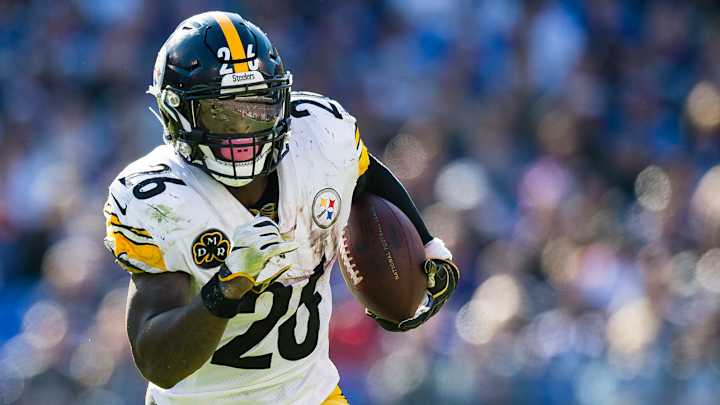Analyzing Le'Veon Bell's Fantasy Value With the New York Jets

At some point this season, Le’Veon Bell and Antonio Brown will share a football field for the 63rd time. It will be the first time they do so as opponents, and the Pittsburgh Steelers, the team with which both became superstars, will be nowhere to be found.
Bell’s yearlong holdout and free agency saga came to an end late Tuesday night or very early Wednesday morning, depending on where you live, when he signed a four-year, $52-million deal to join the New York Jets. Of the three offensive megastars who found new homes in the last week—Brown and Odell Beckham being the others—his fantasy value is the hardest to peg.
Let’s start with the good. He may have sat out a year, but he’s still Le’Veon Bell. He’s the prototype. Four or five years ago when offensive masterminds started building offenses for the new NFL, they looked at Bell and said, “We need that.” He’s the forerunner to Todd Gurley, Alvin Kamara, Ezekiel Elliott and Saquon Barkley, the inheritor of the torch once carried by Marshall Faulk and LaDainian Tomlinson. That doesn’t change because he sat out one year.
Bell is still just 27 years old and among the very best offensive weapons in the league. In five years and 62 games with Pittsburgh, he racked up nearly 8,000 yards from scrimmage, 312 receptions and 42 touchdowns. He averaged roughly 86 rushing yards, 5 receptions for 43 receiving yards, and 0.68 touchdowns per game. Those numbers translate to a 16-game pace of 1,377 rushing yards, 81 receptions, 686 receiving yards, and nearly 11 touchdowns. Leaving behind the friendly environs of Pittsburgh’s offense won’t change the fact that Bell is an elite talent.
Now, on to the unknown. We say all the time in these parts that talent, opportunity and environment comprise fantasy football’s holy trinity. Bell has the first two in spades. The third is a question mark. It isn’t a negative, but it is an unknown for the first time in Bell’s career. Sam Darnold certainly did enough in his rookie year to look the part of a future franchise quarterback slowly but surely coming into his own. He threw for 2,865 yards, 6.92 yards per attempt, and 17 touchdowns against 15 interceptions in 13 starts. He showed some flashes of true brilliance, putting up four games with at least 9.0 YPA and multiple touchdown passes, including his masterpiece, a 341-yard, three-touchdown, 9.74-YPA effort against the Packers in Week 16. He deserves a ton of credit for doing what he did for a 4-12 team with little offensive talent, as well. Darnold is no sure thing, but there’s a better chance that he hits than whiffs.
The rest of the offense looks a whole lot better now that Bell is in the picture. Robby Anderson can be a No. 1 receiver, especially when he has a back like Bell to take away some attention. The receiving corps suddenly looks hopeful, with Quincy Enunwa and the also newly signed Jamison Crowder rounding out the top three. Elijah McGuire is worthy complement to Bell, while Chris Herndon proved last year he can be a productive tight end. It may not be what surrounded Bell in Pittsburgh, but it’s likely, at worst, a league-average supporting cast. And Bell is the sort of player who makes everyone around him better because of the overall effect he has on an offense.
Finally, there’s the potentially bad, at least for Bell’s fantasy value. Adam Gase is the Jets’ new head coach this year. He brought with him from Miami offensive coordinator Dowell Loggains, and hired Jim Bob Cooter, formerly the offensive coordinator in Detroit, as his running backs coach. Those three helmed two of the slowest offenses in football last year. The Dolphins ranked 31st in pace in neutral (game within one score) situations, while the Lions ranked 29th. Before joining Gase in Miami last year, Loggains was the offensive coordinator in Chicago for two seasons, 2016 and 2017. In those two years, the Bears ranked 23rd and 32nd in neutral-situation pace of play. The Lions, meanwhile, ranked 25th and 27th under Cooter those two years. It’s entirely possible that the Jets are among the slowest offenses in the league, which could limit Bell’s touches in a way they never were with the Steelers.
Bell will almost certainly land as a late-first or early-second round pick in typical fantasy football drafts this season. At this still incredibly early stage on the fantasy football calendar, it’s easy to slot him behind Saquon Barkley, Ezekiel Elliott, Christian McCaffrey, Alvin Kamara and Melvin Gordon at his own position. He could also fall behind, Todd Gurley (depending on his knee issues), James Conner, Joe Mixon and Nick Chubb, but those are finer details we won’t be able to nail down for months. All things considered, this could’ve gone much worse for Bell. He’s still going to be an elite fantasy player in 2019.
